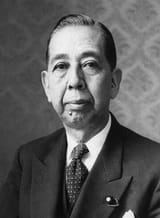Search results for "d425e2ffa083ac06cb97a680235c1606" in md5 (2)
Anonymous
8/25/2025, 5:03:49 PM
No.719009687
>>719009360
>>719009575
>After the resignation of Hatoyama, US intelligence services continued pressuring the LDP to accept Kishi as leader of the Japanese premiership.[90] To the further exasperation of the US intelligence officials, the LDP nominated Tanzan Ishibashi, who was widely regarded as the least pro-American figures out of all of the available candidates that year.[90] Ishibashi would declare that the "era of automatic compliance with American wishes on China was over," further straining relations with the Eisenhower administration.[90] However, Ishibashi was forced into resignation due to his declining health after only two months in office, averting a diplomatic crisis. With support from American officials and the Kuromaku (political "fixer") Yoshio Kodama,[91] Kishi won the premiership in early 1957. US ambassador to Tokyo, Douglas MacArthur II, described Kishi as the only individual capable of preventing a JSP rise in influence. MacArthur warned that the Japanese political climate, without Kishi, would grow increasingly anti-American.[92]
>Kishi's role in the attempt to revise the 1951 Japanese Security Treaty was motivated by the CIA and the Eisenhower administration's advice. Ambassador MacArthur worked with Kishi on a proposed revision to the security treaty, allowing the US to retain its military installations in the country.[92] After the signature of the treaty and the subsequent Anpo protests, with the State Department and CIA seeing Kishi as a public relations liability, the US withdrew its support for Kishi's administration.[93]
Anonymous
 8/25/2025, 5:03:49 PM
No.513968268
8/25/2025, 5:03:49 PM
No.513968268
>>513968263
>>513968266
>After the resignation of Hatoyama, US intelligence services continued pressuring the LDP to accept Kishi as leader of the Japanese premiership.[90] To the further exasperation of the US intelligence officials, the LDP nominated Tanzan Ishibashi, who was widely regarded as the least pro-American figures out of all of the available candidates that year.[90] Ishibashi would declare that the "era of automatic compliance with American wishes on China was over," further straining relations with the Eisenhower administration.[90] However, Ishibashi was forced into resignation due to his declining health after only two months in office, averting a diplomatic crisis. With support from American officials and the Kuromaku (political "fixer") Yoshio Kodama,[91] Kishi won the premiership in early 1957. US ambassador to Tokyo, Douglas MacArthur II, described Kishi as the only individual capable of preventing a JSP rise in influence. MacArthur warned that the Japanese political climate, without Kishi, would grow increasingly anti-American.[92]
>Kishi's role in the attempt to revise the 1951 Japanese Security Treaty was motivated by the CIA and the Eisenhower administration's advice. Ambassador MacArthur worked with Kishi on a proposed revision to the security treaty, allowing the US to retain its military installations in the country.[92] After the signature of the treaty and the subsequent Anpo protests, with the State Department and CIA seeing Kishi as a public relations liability, the US withdrew its support for Kishi's administration.[93]

